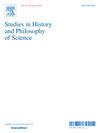The value-ladenness of ancestry
IF 1.8
2区 哲学
Q1 HISTORY & PHILOSOPHY OF SCIENCE
引用次数: 0
Abstract
Clustering humans based on their genetic ancestry is a common practice in human genomics. Genetically similar populations can be seen as statistical constructs that are labeled by population descriptors such as “race,” “ethnicity,” and “genetic ancestry.” Recently, there has been a shift towards replacing the descriptor “race” with “genetic ancestry” because the latter is considered more objective. A descriptor is deemed objective if it adequately captures an underlying feature of the biological world, such as genetic similarities or differences between human sub-populations. However, claims of objectivity do not sufficiently explain the rationale for the choice and use of population descriptors such as “ancestry.” This paper proposes an axiological approach to capture the choice and use of population descriptors in human genomics, by showing that the population descriptor “ancestry” is value-laden and that there is a legitimate role for values in the choice and use of population descriptors in genomics.
祖先的价值负担
基于遗传祖先的人类聚类是人类基因组学中的一种常见做法。基因相似的群体可以被看作是统计结构,用诸如“种族”、“民族”和“遗传祖先”等群体描述符来标记。最近,人们开始用“遗传祖先”取代“种族”这个词,因为后者被认为更客观。如果描述符能充分捕捉生物世界的潜在特征,比如人类亚种群之间的遗传相似性或差异,那么它就被认为是客观的。然而,声称客观并不能充分解释选择和使用诸如“祖先”这样的人口描述符的基本原理。本文提出了一种价值论方法来捕捉人类基因组学中种群描述符的选择和使用,通过表明种群描述符“祖先”是有价值的,并且在基因组学中种群描述符的选择和使用中有价值的合法作用。
本文章由计算机程序翻译,如有差异,请以英文原文为准。
求助全文
约1分钟内获得全文
求助全文
来源期刊

Studies in History and Philosophy of Science
管理科学-科学史与科学哲学
CiteScore
2.50
自引率
10.00%
发文量
166
审稿时长
6.6 weeks
期刊介绍:
Studies in History and Philosophy of Science is devoted to the integrated study of the history, philosophy and sociology of the sciences. The editors encourage contributions both in the long-established areas of the history of the sciences and the philosophy of the sciences and in the topical areas of historiography of the sciences, the sciences in relation to gender, culture and society and the sciences in relation to arts. The Journal is international in scope and content and publishes papers from a wide range of countries and cultural traditions.
 求助内容:
求助内容: 应助结果提醒方式:
应助结果提醒方式:


